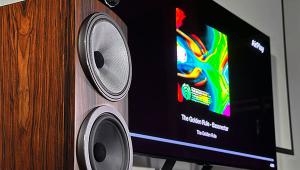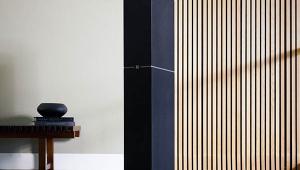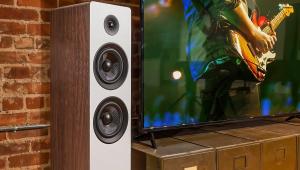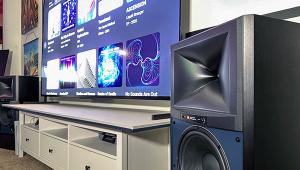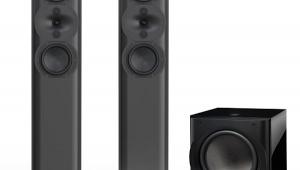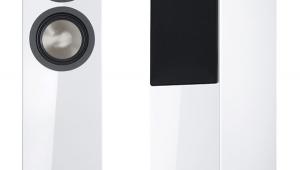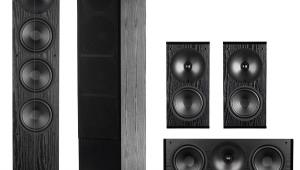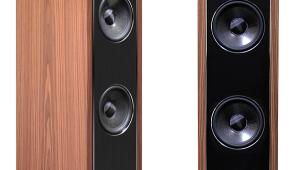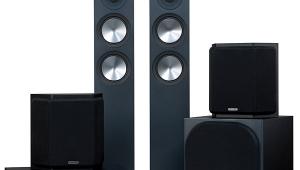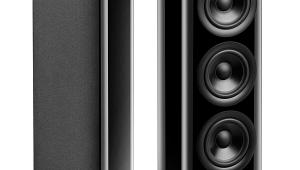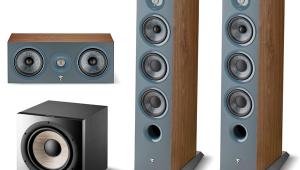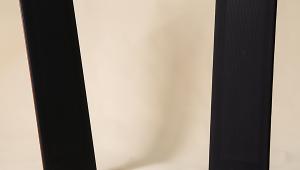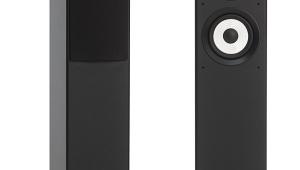Definitive Technology Mythos STS SuperTower Speaker System Page 2
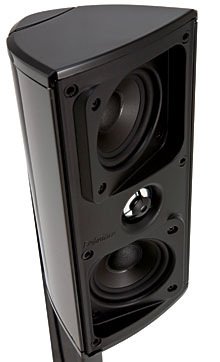 The system is also efficient. With an average set of speakers, I run a movie at about 60 percent of my receiver’s maximum volume setting. I ran this one at less than half. A glance at the rated efficiency specs showed the Mythos STS clocking in at 93 decibels, the Mythos Nine at 91 dB, and the Mythos Gem at 89 dB. The result was an effortless ability to ratchet a movie’s dynamic scale up and down. The system threw out a huge soundstage, even when all speakers were running at high levels. String orchestration (recorded in Prague’s Rudolfinium, where I’ve had the pleasure of attending concerts) was vivid and engaging. Bass was strong enough that I knocked it down a notch from my usual default setting.
The system is also efficient. With an average set of speakers, I run a movie at about 60 percent of my receiver’s maximum volume setting. I ran this one at less than half. A glance at the rated efficiency specs showed the Mythos STS clocking in at 93 decibels, the Mythos Nine at 91 dB, and the Mythos Gem at 89 dB. The result was an effortless ability to ratchet a movie’s dynamic scale up and down. The system threw out a huge soundstage, even when all speakers were running at high levels. String orchestration (recorded in Prague’s Rudolfinium, where I’ve had the pleasure of attending concerts) was vivid and engaging. Bass was strong enough that I knocked it down a notch from my usual default setting.
Prom Night has a Dolby TrueHD soundtrack with relatively restrained dynamics. This time, in addition to vocal clarity, I noticed vocal ambience as well, especially in scenes set in a hotel lobby and elevator. Since there’s a fair amount of screeching as a serial killer methodically nails teen after teen, the opportunity to run everything at a low level was merciful. The orchestra was an instrument of both threat and consummation, nervously hovering around episodes of stalking and then getting excited at the kill. It held together well.
Madagascar delivers its animated animal story in Dolby TrueHD. The opening choral episode—an interrupted version of “Born Free”—is gorgeously textured. Thereafter things get talk-heavy, with voices pristinely recorded as is so often the case with animated movies. For a set of speakers as vocally adept as this one, the movie’s voice cast was a series of softballs routinely knocked out of the park. Occasional snatches of Louis Armstrong (“What a Wonderful World”) and Sammy Davis Jr. (the sinister “The Candy Man”) were like memos from a kinder, gentler universe. The Mythos STS and Mythos Nine thrived on these old chestnuts.
Crisp, Lush, Focused
As I got into music, my comfort level with the towers continued to increase. So did the element of surprise and the sense that the Mythos STS (and friends) became a different set of speakers with each change of material. This became apparent in the mood shifts of the music itself and in my changes in preference for derived surround versus original stereo, which longtime readers will recognize as a longtime preoccupation of mine.
For instance, there was the disciplined pop crispness of Walter Becker’s Circus Money CD. In stereo, it was a little bland. In Dolby Pro Logic II, the female backing vocals became not only fuller (as I expected) but far, far richer (this came as more of a surprise). I missed the comparative ardor of Donald Fagen’s singing, but I came to appreciate Becker’s dry, ironic feeling. The two built-in powered subs were tight and somewhat restrained, more like the twin engines of a Cessna than the brute-force turbines of a 747. After I played movies with a marginally lower setting than my usual one in the LFE channel, I decided a marginally higher setting than usual was better for music.
I reached maximum pleasure with disc nine of Sviatoslav Richter: The Complete EMI Recordings. The great pianist, the Philharmonia Orchestra, and conductor Riccardo Muti were captured at London’s Abbey Road Studios. As any audiophile knows, that’s as good as it gets. Here the surprise was that I preferred stereo to surround. It was far more natural, better focused, and almost equally full. The towers delivered a limpid piano with perfectly coordinated attack, decay, ambience, and left-hand bass component. There was a pleasing warmth and velvet lushness to the strings. I could have been listening to vinyl or SACD. The speakers were capable of euphony and sweetness.
Speaking of SACD, that was the delivery medium for The Jobim Songbook in New York by the David Hazeltine Trio. Some Chesky productions have struck me as nebulous—possibly due to the absence of a center channel, which I normally regard as a missed opportunity. I didn’t miss anything this time. The towers and surrounds generated a soundfield that seemed to gain focus the longer I listened to it. It was precise but not clinical and relaxed but not mushy. The system created one of the most complete versions of the Chesky sound world I’ve ever heard.
With the Mythos STS SuperTower, Definitive has given new life to a product genre that deserves it. The towers are well made, cunningly engineered, and elegant. When you combine them with the Mythos Nine, they are excellent storytellers, especially with the parts of a story that require credible reproduction of the human voice. And they can handle any kind of music. You won’t get as much slam as you’d get from a 12-inch sub, but you get something with which you—and someone else—can live.


